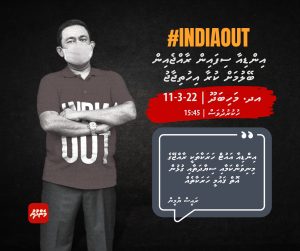The India-Maldives relationship, which has warmed considerably since the Maldivian Democratic Party (MDP) returned to power in 2018, is getting sucked into the whirlpool of the Indian Ocean archipelago’s domestic politics.
At an “India Out” campaign event on March 19 at Naifaru in Lhaviani atoll, former President Abdulla Yameen, who is leader of the opposition Progressive Party of Maldives (PPM), said that if his party returned to power in elections next year, his government would cancel all agreements with India. Under existing agreements, he claimed, Indian military vessels could enter the Maldives’ Exclusive Economic Zone by simply informing Maldivian authorities rather than seeking their permission.
Yameen was referring to an agreement that the MDP government signed with India in February 2021 under which New Delhi undertook to “develop, support and maintain” a coast guard base for the Maldivian National Defense Force at Uthuru Thila Falhu atoll.
The Indian and Maldivian governments maintain that the Uthuru Thila Falhu facility will help Maldives surveil its waters better. The harbor would enable the government “to protect our maritime interests on our own thereby enhancing our sovereignty,” Maldivian Defense Minister Mariya Didi said soon after the signing of the agreement,
Critics claim that the pact undermines Maldivian sovereignty as Indian soldiers are allegedly being stationed in Maldives. They view the agreement as a ruse for India to operate a naval base in Maldives. The agreement, Yameen said at the India Out event at Naifuru, has “hidden parts.” The MDP government, he alleged “is trying to prevent those hidden details from coming out.”
The India Out campaign began in 2020, when opposition parties targeted the MDP government for its growing proximity to India. Accusing it of “selling off Maldives” to India, the opposition demanded the release of Yameen from prison – he was jailed on graft charges at the time – touting the former president as the “solution” to the archipelago’s problems.
The campaign gathered pace after Maldives signed the military agreement with India in February last year and snowballed following Yameen’s release from prison in December.
During Yameen’s presidency (2013-18), Maldives’ foreign policy took a distinctly pro-China turn. The country signed on to China’s Belt and Road Initiative and borrowed heavily from China for infrastructure projects. His defeat in 2018 saw the MDP return to power. It adopted an “India First” policy. To wean Maldives away from Chinese loans, India extended it financial assistance and has undertaken massive infrastructure projects. India’s profile and presence in Maldives has grown remarkably in recent years.
Although the India Out campaign by Yameen and his supporters targets India’s presence in Maldives, it is primarily aimed at the MDP government. The PPM is hoping to stir the kind of unrest that culminated in the ouster of the MDP government in 2012.
In February this year, the Maldivian government announced that it was considering legislation to criminalize the India Out campaign. Although the “bill to stop all actions that could negatively affect relations established by Maldives with foreign countries” did not mention India or the India Out campaign, it would, if enacted, result in participants in the campaign — for example, those maligning Indian officials on social media — being fined, jailed for six months, or held under house arrest for a year.
The bill was expected to sail through the Maldivian parliament, where the MDP holds 67 of 85 seats.
However, its enactment has been stalled with infighting in the MDP intensifying over recent intra-party elections to choose a parliamentary group chief and upcoming elections in May to select a new party chairperson.
The rift between factions led by President Ibrahim Solih and Speaker Mohamed Nasheed, himself a former president, is reported to have worsened in recent weeks.
According to media reports, the Solih faction of the MDP’s parliamentary group has 40 members compared to the 25-member Nasheed faction. The bill, which is Nasheed’s initiative, does not enjoy the Solih faction’s support. Apparently, the latter group perceives the bill as anti-democratic as it curbs a citizen’s right to freedom of expression.
The so-called “India Out Bill” has thus been put on the backburner. This may work out well for India-Maldives relations in the long-term. Without doubt, the draft legislation would have dealt a deadly blow to Maldives’ nascent democracy and strengthened the hands of those opposed to the MDP government. It would have fueled the campaign against the democratically elected MDP government.
Enacting the bill would have allowed Yameen, an authoritarian ruler, to claim the mantle of a democrat by protesting against its provisions. By putting the bill in cold storage the MDP has pre-empted that.
However, the Yameen-led India Out campaign can be expected to continue in the coming months.

































